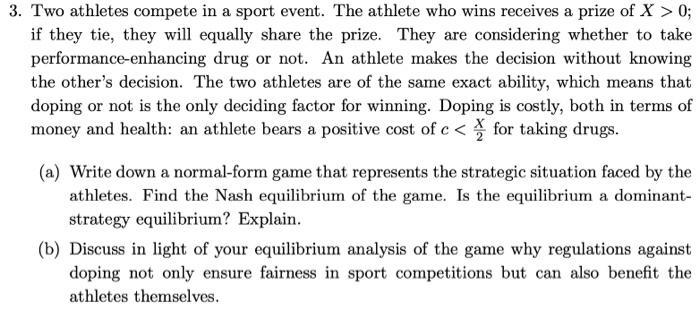Answered step by step
Verified Expert Solution
Question
1 Approved Answer
3. Two athletes compete in a sport event. The athlete who wins receives a prize of X > 0; if they tie, they will

3. Two athletes compete in a sport event. The athlete who wins receives a prize of X > 0; if they tie, they will equally share the prize. They are considering whether to take performance-enhancing drug or not. An athlete makes the decision without knowing the other's decision. The two athletes are of the same exact ability, which means that doping or not is the only deciding factor for winning. Doping is costly, both in terms of money and health: an athlete bears a positive cost of c < for taking drugs. (a) Write down a normal-form game that represents the strategic situation faced by the athletes. Find the Nash equilibrium of the game. Is the equilibrium a dominant- strategy equilibrium? Explain. (b) Discuss in light of your equilibrium analysis of the game why regulations against doping not only ensure fairness in sport competitions but can also benefit the athletes themselves.
Step by Step Solution
There are 3 Steps involved in it
Step: 1

Get Instant Access to Expert-Tailored Solutions
See step-by-step solutions with expert insights and AI powered tools for academic success
Step: 2

Step: 3

Ace Your Homework with AI
Get the answers you need in no time with our AI-driven, step-by-step assistance
Get Started


